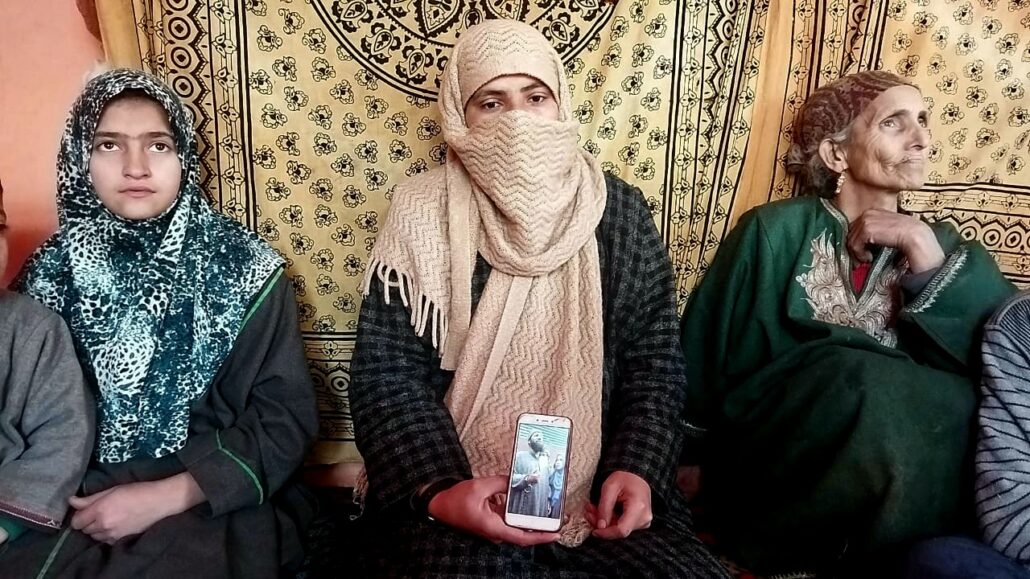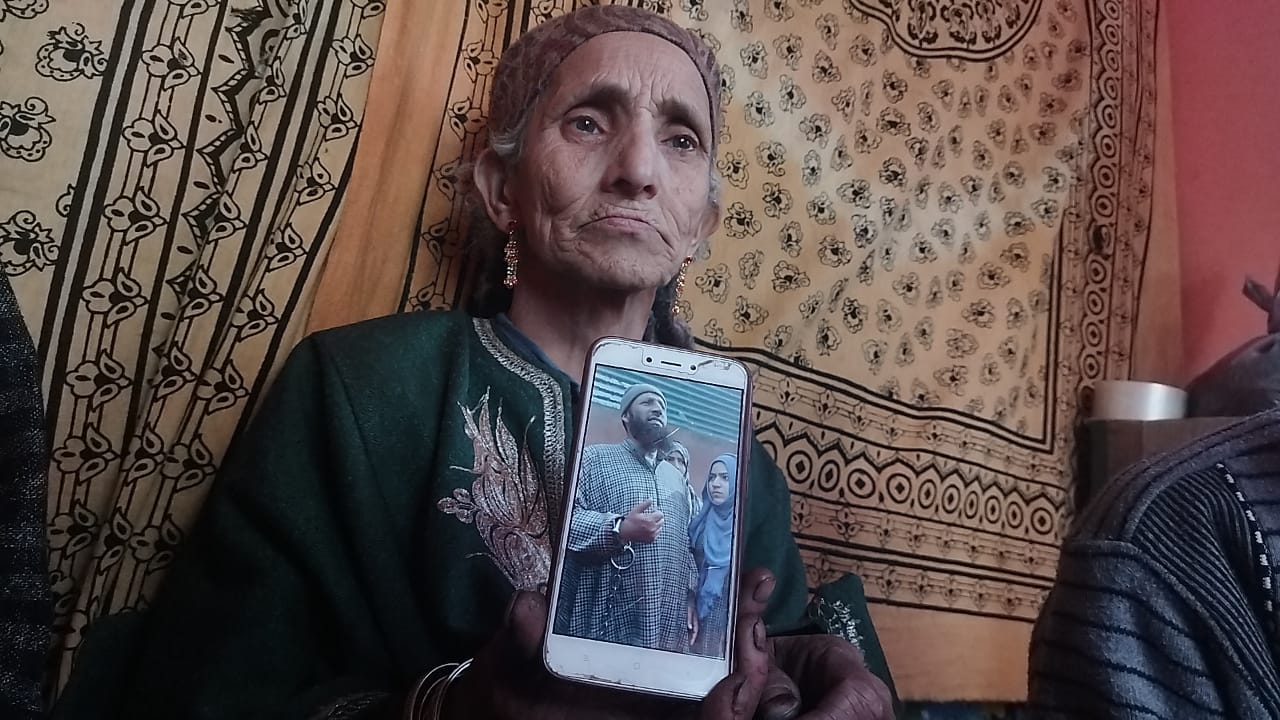
Javaid Mushtaq
It is a cold winter day in Kashmir. Shaheen Bashir Ganie spends her entire day on her stitching machine as she has two orders to finish for the day. Stitching is not what she loves to do, but she cannot stop.
Her brother, Khurshid Bashir Ganie, who was the sole bread earner to the family was arrested in 2017 in a militancy-related case. “The sky crashed down upon us when my brother was taken into jail,” she said cutting to perfection the last piece of the cloth for a Salwar.
Khurshid was initially sought on the charges of sheltering militants in 2017. As he surrendered to the court in early 2018, he was booked in the case related to the killing of six Policemen including the Station House Officer of Achabal, Feroz Ahmed.
The case was registered in the Police Station, Achabal, vide number 82/2017 U/S 302, 397, 326, 427, 120-B RPC, 7/27 Arms Act, and the sections 16,18, 20 Unlawful Activities (prevention) act.
“If my brother is proven guilty, we would happily give him up. But the thing is that they have not been hearing the case for months now. The family he supported financially, is left in tatters now. We are struggling to survive,” Shaheen said.
Aftermath of Khurshid’s Arrest
Belonging to the Breenti area in Dialgam belt of south Kashmir’s Anantnag district, the Ganie family lost their house on July 01, 2017, when the forces cordoned off their house after getting inputs about the presence of senior Lashkar Commander, Bashir Lashkar, in the house. Within hours, Bashir was killed along with his accomplice. The house was razed to rubble within two hours.
As the house was destroyed during the encounter, the family resided in a makeshift (tin) shed for several months, also surviving unending raids and searches by Government Forces for Khurshid. The neighbors provided the family with food and other essentials throughout these months.
Khurshid, an iron-smith by profession was earning livelihood for his family of eight – old aged parents, two daughters, a wife, two sons, and his sister, Shaheen and himself.
buy cenforce online https://www.mabvi.org/wp-content/themes/mabvi/images/new/cenforce.html no prescription
But his arrest brought the family days when they had nothing to eat. “We starved for several days after the arrest of my brother. We consoled his children with lies for many days, till the hunger became unbearable. It was some neighbours who helped us,” Shaheen said.

Shaheen’s Struggle to Earn for the Family
Shaheen could not bear the sufferings of her family members. “I, eventually, decided that I will work and take care of the family,” Shaheen told The Kashmiriyat. Remembering the struggle of her initial days she said that it was scary for her to visit the Police Stations to get the reports of the FIRs, her brother was accused in. “At times, there was no male member to accompany me. I would do rounds of camps and the Police Stations on my own,” Shaheen said.
Eventually, after weeks of struggle, she gathered the papers of the cases against her brother Khurshid. “The next part was to find a lawyer. I had never visited the court in my life. It was tough, but I managed to find him a good lawyer. I have been following the legal process since then. From following formalities to tracking the hearing, I have done everything, and that too for the first time in my life. I had no choice,” she told The Kashmiriyat.
As Shaheen was doing rounds of Police stations to collect the legal papers, her father Bashir Ahmed fell severely ill. “He needed medicines and We had no money. Nothing, literally!” she said. Shaheen said that she went to several neighbours, who helped her with money to pay for the medicines. “With time, it got tougher to ask for money time and again. The locals had already contributed a lot for the construction of our house,” she said, adding, “When expenses increased, I decided to take the load on my shoulders.”
“I knew stitching. So I picked up my machine and decided to work for the family and take care of them in my brother’s absence. There was nobody else in the family. My father is too frail to work. With time, I started receiving orders from people in the locality. Money came into the house,” she said.
Speaking to The Kashmiriyat, Shaheen said that during his time in incarceration, Khurshid fell severely ill and he needed medicines. “I started working for extended hours on the machine for being able to pay for his medicines and the tuition fees for Khurshid’s children,” she said.
Shaheen says that she often cannot remember when she slept the last. “I cannot remember when I sleep or have slept the last. I sometimes fall asleep and then I remember that I cannot afford to sleep. I have to work, see my family and take care of them because Khurshid is not here, anymore,” Shaheen stated.
buy tadalista online https://www.mabvi.org/wp-content/themes/mabvi/images/new/tadalista.html no prescription
Sometimes, the money does fall short, Shaheen said. “At times, I have no work, so Khurshid’s youngest son goes out there to find work. He works as a laborer for a day or two and pays for the ration,” she said.
Khurshid had fixed Shaheen’s marriage and it was scheduled for November 2017. “I have dropped the idea of getting married. I will not get married until Khurshid is out of the Jail. I will fight for my brother. I will earn to take care of my family,” Shaheen told The Kashmiriyat.
Myriads of Kashmiris Languish in Jails
An RTI filed by two students of Kashmir University in December last year revealed that the jails in Jammu Kashmir are overcrowded during times of global pandemic despite the supreme court orders of decongesting the jails.
Earlier in April, as the global pandemic spread in India, a three-member committee headed by J-K State Legal Services Authority Executive Chairman, Justice Rajesh Bindal, ordered the release of jail inmates, except those involved in militancy-related cases to decongest the prisons in the region.
The figures reveal that a total of 4031 prisoners are lodged in fourteen jails across Jammu Kashmir against a capacity of 3660 persons.
The data accessed by The Kashmiriyat revealed that a total of 747 prisoners are lodged across the 14 jails in militancy-related cases. Most of them, i.e., 143 have been lodged in Srinagar’s Central Jail followed by 130 in Kot Bhalwal Jail of Jammu. A total of 1.8 percent out of those arrested in militancy-related cases have been convicted.




